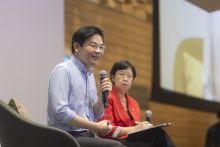Spotlighting essential household needs at the SMU-DBS Foundation Symposium

The SMU-DBS Foundation Symposium on Essential Household Needs in Singapore focused on sharing new findings on the Singaporean consensus of what constitutes essential needs, as experienced by groups in society that may be deprived of such essentials and on ways to enhance access for these groups.
“We’re privileged to be part of today’s symposium, and of an essential conversation with like-minded parties who share our commitment to taking a whole-of-society approach to drive change,” said Ms Monica Datta, Lead, Fostering Inclusion, at DBS Foundation, at the symposium on 12 July.
“At DBS Foundation, we hope to join forces with those who share our goal of uplifting the vulnerable and creating a more inclusive Singapore for all,”
The paper in question, titled “Report on Findings from Household Needs Study” (HNS) was spearheaded by Professor Paulin Straughan, director of SMU Centre for Research on Successful Ageing (ROSA) and Dr Mathew Mathews, head of Social Lab, and Principal Research Fellow at the Institute of Policy Studies (IPS).
“SMU ROSA is delighted to continue its partnerships with the government and industry to foster a more inclusive society through research. It is crucial for us to understand and address these needs to advance health span and holistic well-being for Singaporeans,” said Professor Straughan.
Identifying “essentials”
As part of the study, 4,014 respondents were surveyed from October 2022 to February 2023. The study aimed to identify what Singaporeans deem to be essential for a normal life in Singapore, as well as examine Singaporeans’ ability to afford such items and activities across different household income, housing type, and age groups. It also surveyed Singaporeans’ general attitudes and beliefs towards reasons for poverty.
Out of the 51 items in the poll, 40 were regarded as essential for daily household needs by a majority of Singaporeans: household appliances like refrigerators and washing machines, items related to digital connectivity, as well as social activities like going out with family and friends.
Opinions were more divided on items such as air conditioning and “dining out at a restaurant at least once a month”.
Income or housing type of respondents affected whether certain items were considered essential. For instance, 34 per cent of respondents living in 1- and 2-room HDB flats thought air conditioning was essential, compared to 78 per cent in private housing.
Two-thirds of respondents reported that they had access and/or could afford all 40 “essentials” while the remaining one-third lacked access to an average of four.
As a nationally representative population-based survey, the study can help academics, government agencies, social service practitioners, philanthropists and more to understand and develop social policy and practice.
In particular, the survey can be helpful in ensuring that essential items are provided for those in need. It also highlights the importance of considering activities pertaining to social inclusion as essential to one’s quality of life.
Who should provide “essentials”
At the symposium, Dr Matthews also presented findings of a separate IPS poll on Singaporeans’ perception on who should provide for essential items for those in need. More respondents were inclined to view “self” as the main provider of essential items, followed by “the Government”, “community”, “relatives/friends”, and then “businesses” – all in that order.
The poll found that 67 per cent of respondents believed the Government should help Singaporeans who cannot afford bare necessities such as three meals a day, shelter and access to healthcare, while 62 per cent believed that individuals are responsible for providing items associated with a “decent” standard of living, such as dining out at restaurants once a month.
Both the IPS poll and the HNS were conducted as part of the Ministry of Social and Family Development’s (MSF) regular partnerships with academics to enable informed and evidence-based policy making and funded by MSF.
See also: New Study Identifies 40 Items Deemed Essential for Singaporeans’ Household Needs | SMU Newsroom


